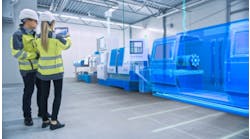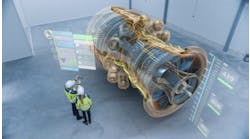Smart Industry: What are the benefits of smart roads?
Derek: Smart roads are able to work within a connected infrastructure network that will improve overall transit of goods and people. Smart roads can provide drivers with warnings and information regarding hazards, such as ice. They can provide lane-flexibility to reduce traffic congestion or provide segmented sections by drive or vehicle type. And smart roads can provide data on driver performance, traffic flow and so much more.
Smart Industry: What do smart roads mean for the manufacturing industry?
Derek: There are different perspectives. Smart roads will facilitate goods transportation, fleet management and tracking in the short term, albeit we are likely to find other means of goods transportation in the future or maybe the roads will be kept specifically for that. On the actual manufacturing side, there will be emerging opportunities for new industries from major developments on the materials side, AI and sensor technologies, machine learning and deep analytics, new signaling and network-support products, groundbreaking robotics and autonomous equipment for construction itself, along with new frontiers in telematics, BIM and GPS.
Smart Industry: How do smart roads affect auto-manufacturers?
Derek: From multiple angles, such as interfaces like adaptive driving and sensor networks, potential for autonomous and self-driving vehicles within the network, new safety and security interfaces, new safety systems. There will be feedback loops that improve manufacturing efficiencies, materials development, machinery architecture, etc.
Smart Industry: Explain the process you take to establish your forecasts?
Derek: I apply a robust six-stage science of foresight process, otherwise known as studies of the future. We are looking to create probable and preferred futures, based on discontinuous change, while taking into account both potential positive and negative disruptors. We use horizon scanning, systems modeling, and alternative thinking to identify insights that help discover critical future drivers. From there, we develop a platform and future scenarios to determine the most plausible or preferred future. The next step is creating a "Rolling Back the Future" of tactical points and milestones that will help us get to the creation and implementation of that vision.
Smart Industry: What leads you to believe that smart roads are coming?
Derek: Using the above process we can begin to envision how elements are coming together: the harmonization of emerging technologies, social change and the growing need to replace failing infrastructure with a new vision for sustainable vehicles and infrastructure, impending legislation, the project improvement in economic performance in terms of goods transportation, and the need for congestion reduction.
Smart Industry: What factors do you think are going to deter or accelerate the use of smart roads?
Derek: Deter: cost, complexity of implementation in certain environments, federal budget constraints, the pace of full development of salient technologies. Accelerate: development of smart vehicles, sensor and other smart technologies, falling cost of technologies over a 5-7 year span, the ability to interface the driver/vehicle/road for the first time in order to generate new benefits such as energy-harvesting and significantly reduced costs and time in road repair achieved via an emerging development of new materials and road-building technologies.
Smart Industry: How do you think the transition to smart roads could affect our day-to- day lives?
Derek: The use of smart roads will reduce congestion, enable improved mass-transit systems, reduce driving time, reduce accidents and road deaths, and improve our overall safety and desire for travel.
Smart Industry: Do you foresee a “Eureka!”’ moment for smart road development? If so, what do you think it will be?
Derek: There are two aspects to smart roads. A) Road construction—development of nanomaterials, coatings, self-healing concrete, asphalt and other kinetic materials that will increase road life. B) The use of smart roads—the development of systems that improve safety and flow and that make the vehicle, driver and road one for the first time.
Smart Industry: How will the mounting needs for existing infrastructure improvements impact smart road development?
Derek: This will, hopefully, help as there is a real need. However, we can expect sectional development and specialized lanes, etc. in the first place.
Smart Industry: What is the interplay between smart roads and the Industrial Internet of Things?
Derek: This interplay will clearly enable new networks of data and monitoring from multiple sources in a way that will improve security and safety, support drive-past information and entertainment, enable car-to-car interaction and real-time monitoring.



